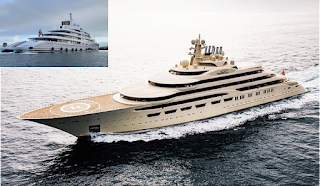A Glimpse into Privilege In the grand tapestry of European wealth,
I. Introduction to Europe's Youngest Billionaires
Europe, replete with its historical monarchies and deep-rooted family enterprises, is not just a continent rich in culture but also in wealth. Among its diverse population are those who, by fortune of birth or remarkable acumen, have accrued wealth to become some of the world's youngest billionaires. Much intrigue surrounds these youthful magnates who sit atop immense fortunes, often exceeding those of seasoned business moguls many times their age.
The spectrum of Europe's youngest billionaires is as variegated as the continents' countries themselves. From heirs to storied family estates and business empires that span decades or even centuries to self-made entrepreneurs who have tapped into the zeitgeist with groundbreaking startups and technology ventures, these individuals represent the pinnacle of financial success amongst Europe's youth. They are testaments to varying paths of wealth attainment - some scripted by lineage and others carved by innovation and market disruption.
As one delves into the profiles of these affluent young individuals, patterns emerge, highlighting the interplay between old money and new opportunities. The narrative is not merely about the possession of billions but also about the responsibilities and societal expectations that accompany such wealth. The impact of their financial power extends beyond personal luxury; it shapes industries, philanthropy, and, at times, even governmental policies.
Consequently, the stories of Europe's youngest billionaires are not just tales of wealth but are also windows into the changing landscapes of power and influence in a modern context. They offer insights into the evolving dynamics of the continent's economy, societal structures, and even the shifts in cultural norms regarding wealth creation and stewardship.
II. Unveiling Europe's Richest Kid:
A Glimpse into Privilege In the grand tapestry of European wealth, there lies a narrative seldom told, that of the continent's richest kid—a title that carries with it both fascination and scrutiny. Secrecy often shrouds the identity of such a young magnate due to privacy concerns and the protective instincts of influential families. However, from time to time, the veil lifts, granting us a peek into what can only be described as a life of extraordinary privilege.
While exact names and fortunes may fluctuate with time and the tides of the economy, the current titleholder for the richest kid in Europe is typically an heir or heiress to a monumental family empire—a benefactor of generational wealth that has compounded over decades, if not centuries. This young individual, often surrounded by the trappings of luxury and high society, is set apart not just by their youthful age, but also by a net worth that dwarfs that of the average adult.
Their wealth is not self-made but rather inherited, often stemming from industries that have long been the backbone of European economic powerhouses—luxury goods, pharmaceuticals, automotive, and technology to name a few. It is in the complex interplay of legacy, lineage, and capital where we find this young elite, whose fortune is intrinsically tied to their family's name and the historic influence they wield.
In exploring the privilege of Europe's richest kid, it's important to note that while their economic status is envied by many, it comes with a unique set of expectations and responsibilities that shape their upbringing and personal development profoundly. As much as their wealth defines them, it is their journey into adulthood under such unparalleled circumstances that truly spells the legacy they will eventually carry forward.
III. The Making of a Fortune: How Europe's Wealthiest Child Got Their Wealth
The ascent to the financial zenith for Europe's richest kid is often steeped in a tapestry of inheritance, savvy investments, and the burgeoning success of family enterprises. This privileged child's wealth is typically not self-made but is the culmination of generations of strategic planning and stewardship of family assets. The foundation of such immense wealth can usually be traced back to industries that have long been the cornerstones of European economies such as manufacturing, luxury goods, pharmaceuticals, or technology.
In many cases, the wealth that Europe's wealthiest youngster enjoys is the fruit of brand empires that have been carefully cultivated and expanded over decades or even centuries. For instance, the child could be the heir to an iconic fashion label or a stakeholder in a multinational conglomerate, and these positions are often entrenched at birth.
Moreover, familial wealth is often fortified by the allocation of stocks and shares in the company, which grow in value over time, or through dividends that provide a steady income stream. Trust funds are also a common tool utilized to safeguard and regulate the flow of wealth to the upcoming generation, ensuring financial security and stability from a tender age.
Strategic marriages also play a role in the amplification of wealth, where dynastic unions serve to consolidate and expand the family's financial clout and influence. All in all, Europe's richest kid's fortune is generally the result of a well-oiled machine of wealth preservation and multiplication, one that has been meticulously maintained through the ages.
IV. The Impact of Inheritance and Family Dynasties in EuropeInheritance
It plays a pivotal role in shaping the landscape of wealth in Europe, where historic family dynasties continue to wield significant economic power and influence. The richest kid in Europe, often a title bestowed upon heirs of these affluent families, exemplifies the profound effect of generational wealth transfer within the continent. This wealth is not solely a result of the past generation’s success but is frequently accumulated over centuries, as prominent families in industries such as luxury goods, manufacturing, and finance pass down their fortunes.
The prevalence of family dynasties in Europe has a substantial impact on wealth distribution, as substantial assets and control over multinational corporations are inherited rather than self-made. This concentration of wealth preserves a hierarchy that can sometimes limit social mobility and perpetuate economic disparities. Nevertheless, these dynasties also bear the responsibility of preserving legacy businesses and contributing to economic stability through their long-term investments and philanthropy.
Historic laws in Europe, such as primogeniture, which traditionally saw the firstborn male inheriting the entire estate, have evolved, but the essence remains in the form of family trusts and holding companies designed to protect family wealth. The European approach to inheritance often involves grooming heirs from a young age to take over the family business, ensuring strategic continuity and sustained influence across generations.
Understanding the intricacies of these wealthy European families offers insight into the magnitude of their influence and the societal structures that uphold their legacy. The continued presence of these dynasties speaks to a tradition that blends the historic past with the economic future of the continent.
V. Spotlight on Lifestyle: How Europe's Richest Kids Spend Their Days
Living a life that most can only dream of, Europe's richest kid is often surrounded by opulence and luxury. Secluded from the ordinary, their days are a blend of private tutoring, exclusive events, and travel. The morning might begin with a selection of bespoke activities designed to educate and entertain; whether it be learning a new language with a native speaker or mastering an instrument under the guidance of a renowned musician.
Their afternoons could be spent engaging in high-end leisure activities like horseback riding through private estates, racing yachts along the Riviera, or practicing their swing on a family-owned golf course. Such pastimes not only provide pleasure but are also networking hubs, where the future elite forge relationships that will shape their personal and professional lives.
Philanthropy also plays a significant role, with many of Europe's wealthiest families instilling a sense of responsibility from a young age. This might involve participating in charity events, art galas, or environmental initiatives that reflect the family's values and areas of influence.
When it comes to travel, it is in the lap of luxury, be it aboard a private jet for a weekend getaway to an exclusive alpine lodge or a family-owned island for a sun-soaked retreat. Vacations are opulent and carefully curated experiences that most people accumulate a lifetime of memories to experience just once.
Evenings are crowned with high-profile gatherings and meticulously planned dinners that showcase the finest cuisine, often accompanied by influential guests from various industries.
In essence, the lifestyle of Europe's richest kid is an extraordinary composition of privilege, learning, and careful grooming for their eventual role in their family's legacy and business empire.
VI. The Future of Wealth:
What Lies Ahead for Europe's Affluent YouthThe trajectory of wealth among Europe's most affluent youth suggests a future that is as fascinating as it is unpredictable. As the world braces for transformative changes - from technological advances to socio-economic shifts - the heirs and heiresses of Europe's grandest fortunes are positioned at the forefront of potential unprecedented change.
Among this gilded youth, the richest kid in Europe is likely to face a complex weave of expectations and responsibilities. The onus to expand and sustain familial legacies in a rapidly modernizing world brings with it the challenge to innovate and adapt. Companies tied to these fortunes must evolve within the environmental, social, and governance (ESG) parameters that have become increasingly important to both consumers and investors. This suggests that Europe's richest child will not only inherit wealth but the need to redefine it in terms of social capital and responsible stewardship.
Moreover, with wealth concentration often sparking debates on inequality, these young heirs are likely to grapple with the moral and ethical aspects of their fortunes. Balancing personal indulgence with philanthropy, they may invest in social enterprises and impact-driven initiatives, reflecting a shift towards conscientious capitalism.
In the educational sphere, elite schooling alongside global exposure and networking opportunities will undoubtedly shape the worldview and business acumen of Europe’s richest kid. As they come of age, the integration of technology and the pursuit of sustainable solutions are expected to be key focuses for these scions, signaling a future where old money embraces new ideas to address the ever-evolving challenges of our world.








Comments
Post a Comment